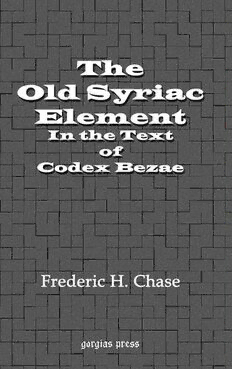Download The Old Syriac Element in the Text of Codex Bezae PDF Free - Full Version
Download The Old Syriac Element in the Text of Codex Bezae by F H Chase in PDF format completely FREE. No registration required, no payment needed. Get instant access to this valuable resource on PDFdrive.to!
About The Old Syriac Element in the Text of Codex Bezae
This pioneer-work of F. H. Chase (1853-1925) offers an interpretation of the famous Codex Bezae (D 05), a Greek-Latin bilingual of the 5th century, which is the key manuscript of the so-called "Western text". This Codex attracted much attention by its eccentric Greek text, and for generations, textual critics devoted a lot of research on the origin, development, and influence of this text. Chase offers a thorough Syriac approach to solve the secret of Codex Bezae. The eccentric character of its Greek text, he explains, is due to continuous accommodation to a Syriac text of "Old Syriac" type. All passages under examination are taken from the Book of Acts, although no "Old Syriac" manuscript of Acts was discovered until today. Chase assigns the Syriacisation of the Codex Bezae to a date earlier than that of the Syriac Peshitta by external and internal evidence, thus deducing the "Old Syriac" base of the Syriacisation, and a second-century origin of the Bezan text of Acts. Chase's book is an independent contribution to the textual criticism of the New Testament. It reminds scholars not to neglect the Syriac perspective on textual problems and will remain useful by the materials it compiles.
Detailed Information
| Author: | F H Chase |
|---|---|
| Publication Year: | 2004 |
| ISBN: | 9781593331665 |
| Pages: | 177 |
| Language: | English |
| File Size: | 11.661 |
| Format: | |
| Price: | FREE |
Safe & Secure Download - No registration required
Why Choose PDFdrive for Your Free The Old Syriac Element in the Text of Codex Bezae Download?
- 100% Free: No hidden fees or subscriptions required for one book every day.
- No Registration: Immediate access is available without creating accounts for one book every day.
- Safe and Secure: Clean downloads without malware or viruses
- Multiple Formats: PDF, MOBI, Mpub,... optimized for all devices
- Educational Resource: Supporting knowledge sharing and learning
Frequently Asked Questions
Is it really free to download The Old Syriac Element in the Text of Codex Bezae PDF?
Yes, on https://PDFdrive.to you can download The Old Syriac Element in the Text of Codex Bezae by F H Chase completely free. We don't require any payment, subscription, or registration to access this PDF file. For 3 books every day.
How can I read The Old Syriac Element in the Text of Codex Bezae on my mobile device?
After downloading The Old Syriac Element in the Text of Codex Bezae PDF, you can open it with any PDF reader app on your phone or tablet. We recommend using Adobe Acrobat Reader, Apple Books, or Google Play Books for the best reading experience.
Is this the full version of The Old Syriac Element in the Text of Codex Bezae?
Yes, this is the complete PDF version of The Old Syriac Element in the Text of Codex Bezae by F H Chase. You will be able to read the entire content as in the printed version without missing any pages.
Is it legal to download The Old Syriac Element in the Text of Codex Bezae PDF for free?
https://PDFdrive.to provides links to free educational resources available online. We do not store any files on our servers. Please be aware of copyright laws in your country before downloading.
The materials shared are intended for research, educational, and personal use in accordance with fair use principles.

